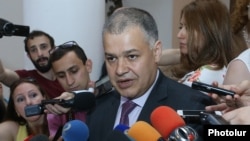Armenian activists oppose draft antiterrorism law
| Publisher | Radio Free Europe/Radio Liberty |
| Publication Date | 14 March 2018 |
| Cite as | Radio Free Europe/Radio Liberty, Armenian activists oppose draft antiterrorism law, 14 March 2018, available at: https://www.refworld.org/docid/5b20dd3da.html [accessed 27 May 2023] |
| Disclaimer | This is not a UNHCR publication. UNHCR is not responsible for, nor does it necessarily endorse, its content. Any views expressed are solely those of the author or publisher and do not necessarily reflect those of UNHCR, the United Nations or its Member States. |
March 14, 2018 19:39 GMT
By RFE/RL's Armenian Service
 Armenian Justice Minister Davit Harutiunian has dismissed criticism of the draft legislation. (file photo)
Armenian Justice Minister Davit Harutiunian has dismissed criticism of the draft legislation. (file photo)
Activists in Armenia have voiced concern that an antiterrorism provision included in a draft criminal code could be used to criminalize criticism of the government.
The proposed amendment sets out a potential three-year prison term for publicly justifying, promoting, or financing domestic or international "crimes of terrorism."
Artur Sakunts, head of the Vanadzor-based Helsinki Citizens Assembly, warned on March 14 that, should the law be enacted, the authorities might be able to use its provisions to punish political opponents who speak up in public debates.
He said he is not opposed to fighting terrorism, but faulted the legislation for not explicitly identifying what would be considered "terrorism."
"Even the most extreme and offensive speech against a [government] official cannot serve as grounds for prosecution, because it is protected – it is public opinion," Sakunts said.
He cited the 2016 standoff between police and more than 30 members of the Sasna Tsrer armed group that seized a police station in Yerevan's Erebuni district. The group held the station for more than two weeks before surrendering to police.
Thousands of the gunmen's supporters joined nightly rallies, occasionally clashing with police. Several dozen activists were arrested during the events.
But he said that during the standoff, many "neutral" citizens demonstrated against a potential violent storming of the police station, and he expressed concerns that people in this type of situation could be arrested under the proposed law.
Another rights activist, Avetik Ishkhanian, head of the Helsinki Committee of Armenia, also expressed concerns that such a draft law could be "applied arbitrarily."
Justice Minister David Harutiunian, who authored the bill sponsored by the ruling Republican Party, dismissed the criticism.
"There is no criminal offense in this draft that has been included with anyone particular in mind," he said.
"We study the experience of other countries on every step that can be seen as controversial," he said.
"We discuss things with international experts to see the experience of courts in other countries, their interpretations."
He added that backers of the bill are willing to listen to proposals from civil society and human rights activists on the planned provision on terrorism.
If the new criminal code reaches the parliament, its adoption will be a foregone conclusion, given that the majority Republican Party and its junior coalition partner, Dashnaktsutyun, have 65 seats in the 105-seat body.
The main opposition faction, Yelk, has just nine members, and another nominally opposition grouping, the Tsarukian alliance, has 31 members but usually votes in favor of government-backed bills.
Political Challenges
The Armenian leadership has gone through years of political challenges.
A newly created group, the Front for the State of Armenia, held its first rally in the capital, Yerevan, on March 10, with supporters calling for the creation of a provisional government and the release of political prisoners.
The group's leaders urged opposition political parties to join hands and prevent outgoing President Serzh Sarkisian from retaining power after his second and final term expires on April 9.
Armenia's parliament on March 2 elected Armen Sarkisian, who has no relation to his predecessor, as the country's next president.
Following a referendum in December 2015, Armenia changed its form of government from a semipresidential to a parliamentary republic.
As a result, presidential veto powers are being stripped from the post and the presidency is being downgraded to a figurehead position elected to a single term by parliament every seven years rather than a direct popular vote.
Skeptics see the constitutional reforms as a way for outgoing President Sarkisian to maintain political control in Armenia by becoming prime minister when the mandate for his second five-year presidential term expires.
Written by Sisak Gabrielian
Link to original story on RFE/RL website
